Unit 4 Humor Lesson 1 What’s So Funny? Grammar课件(共30张PPT,内镶嵌视频)北师大版(2019)选择性必修第二册
文档属性
| 名称 | Unit 4 Humor Lesson 1 What’s So Funny? Grammar课件(共30张PPT,内镶嵌视频)北师大版(2019)选择性必修第二册 |

|
|
| 格式 | pptx | ||
| 文件大小 | 28.3MB | ||
| 资源类型 | 教案 | ||
| 版本资源 | 北师大版(2019) | ||
| 科目 | 英语 | ||
| 更新时间 | 2025-08-01 11:03:08 | ||
图片预览

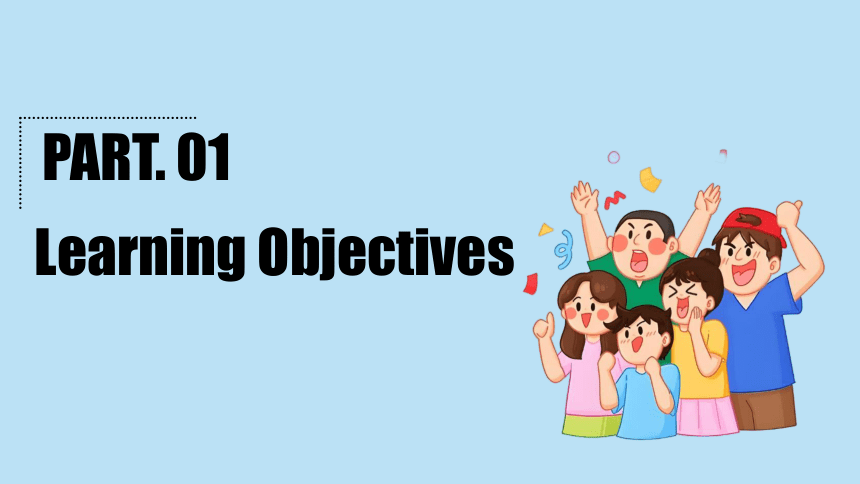
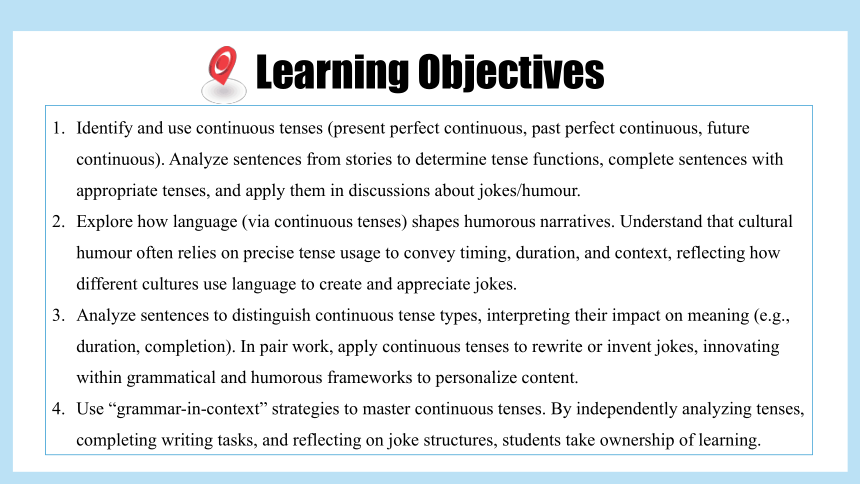
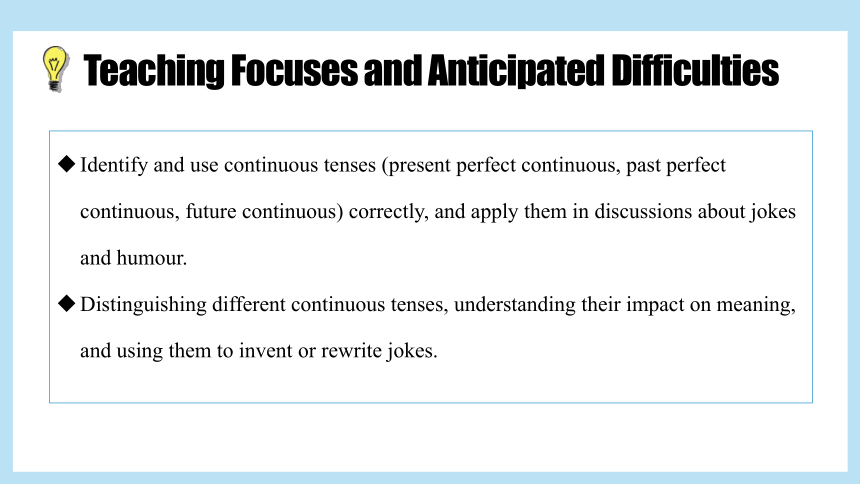
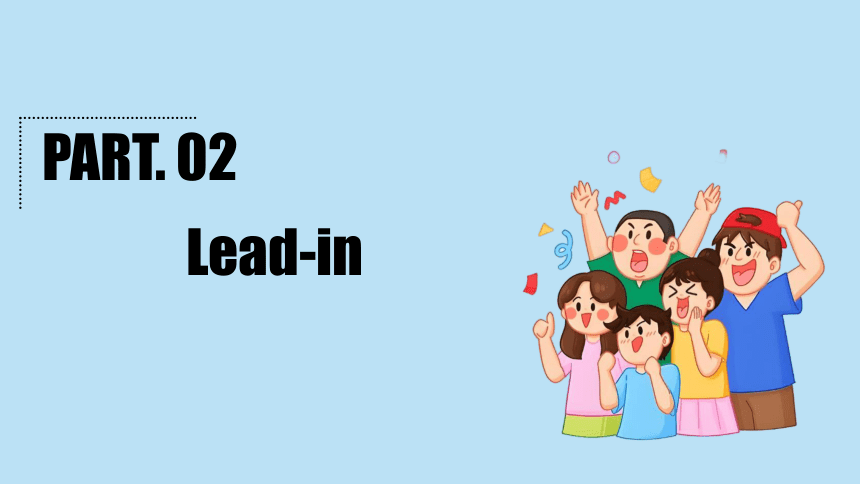
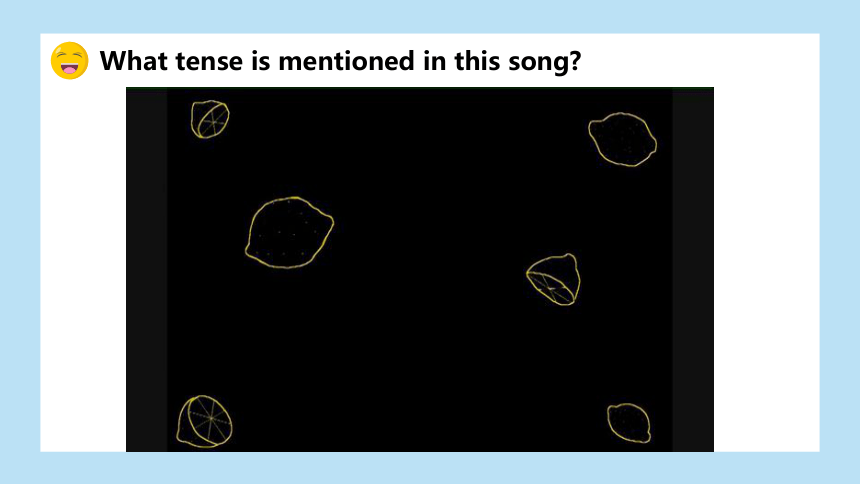
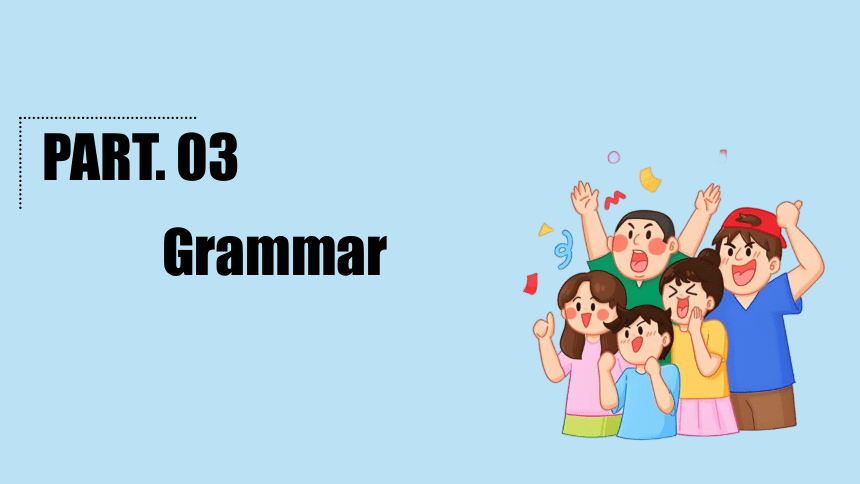
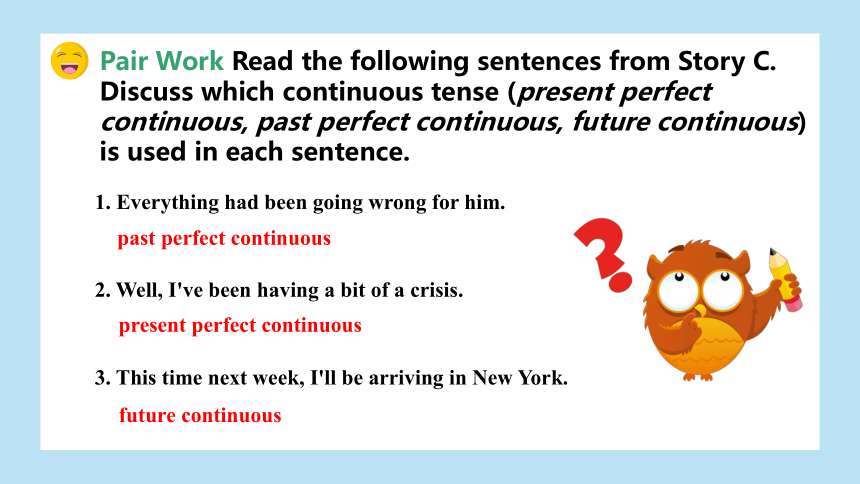
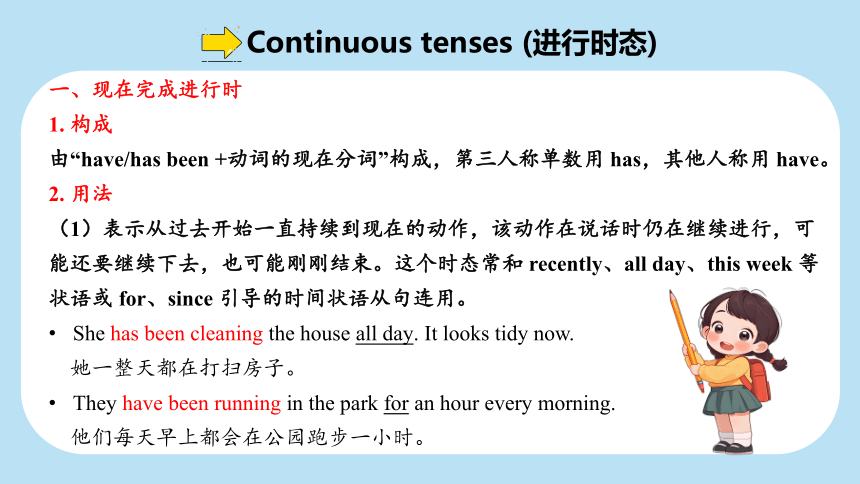
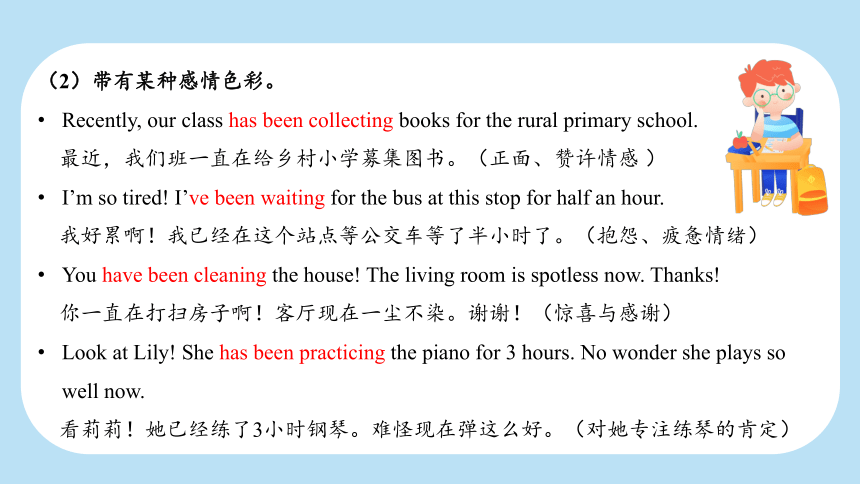
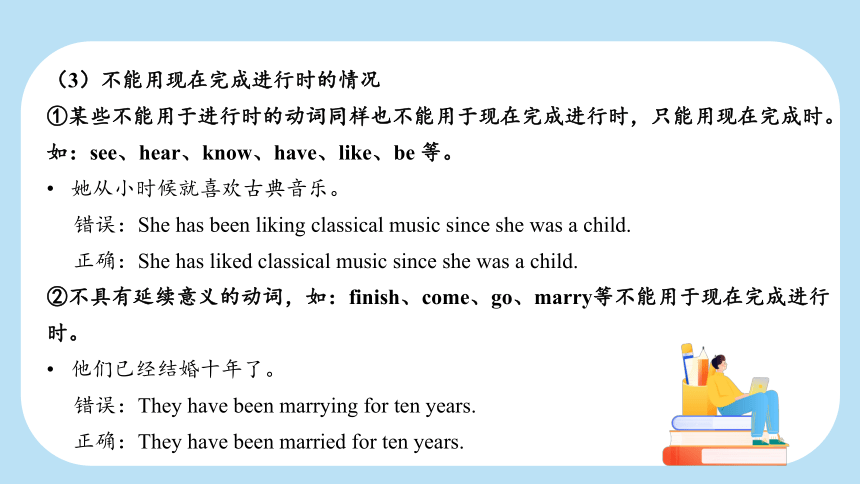
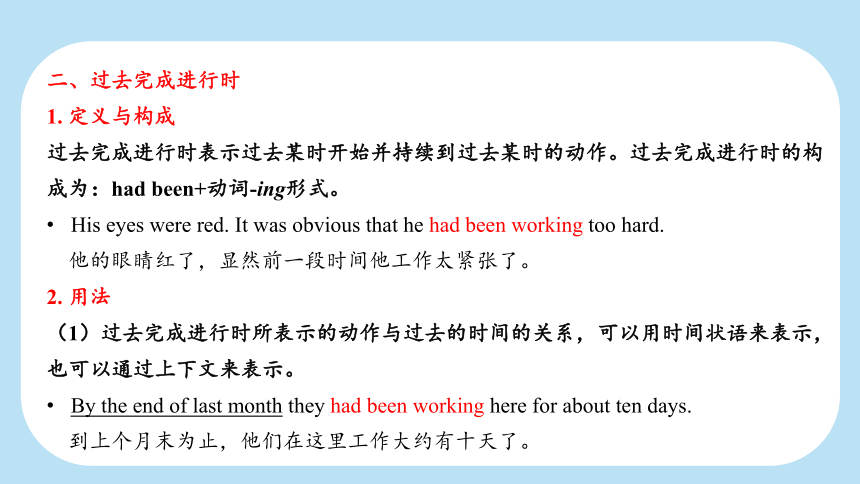
文档简介
(共30张PPT)
Unit 4
Humour
Lesson 1 (Grammar)
Learning Objectives
PART. 01
Understand the daily study and life of British middle school students by watching videos. Based on your own daily study and life, compare the study and life in Chinese and British schools, and find out the similarities and differences between the two. Talk about your first impression of high school life, and have a preliminary perception of the study and life in the senior high school stage.
Learning Objectives
Identify and use continuous tenses (present perfect continuous, past perfect continuous, future continuous). Analyze sentences from stories to determine tense functions, complete sentences with appropriate tenses, and apply them in discussions about jokes/humour.
Explore how language (via continuous tenses) shapes humorous narratives. Understand that cultural humour often relies on precise tense usage to convey timing, duration, and context, reflecting how different cultures use language to create and appreciate jokes.
Analyze sentences to distinguish continuous tense types, interpreting their impact on meaning (e.g., duration, completion). In pair work, apply continuous tenses to rewrite or invent jokes, innovating within grammatical and humorous frameworks to personalize content.
Use “grammar-in-context” strategies to master continuous tenses. By independently analyzing tenses, completing writing tasks, and reflecting on joke structures, students take ownership of learning.
Understand the daily study and life of British middle school students by watching videos. Based on your own daily study and life, compare the study and life in Chinese and British schools, and find out the similarities and differences between the two. Talk about your first impression of high school life, and have a preliminary perception of the study and life in the senior high school stage.
Teaching Focuses and Anticipated Difficulties
Identify and use continuous tenses (present perfect continuous, past perfect continuous, future continuous) correctly, and apply them in discussions about jokes and humour.
Distinguishing different continuous tenses, understanding their impact on meaning, and using them to invent or rewrite jokes.
Lead-in
PART. 02
What tense is mentioned in this song
Grammar
PART. 03
Pair Work Read the following sentences from Story C. Discuss which continuous tense (present perfect continuous, past perfect continuous, future continuous) is used in each sentence.
1. Everything had been going wrong for him.
2. Well, I've been having a bit of a crisis.
3. This time next week, I'll be arriving in New York.
past perfect continuous
present perfect continuous
future continuous
Continuous tenses (进行时态)
一、现在完成进行时
1. 构成
由“have/has been +动词的现在分词”构成,第三人称单数用 has,其他人称用 have。
2. 用法
(1)表示从过去开始一直持续到现在的动作,该动作在说话时仍在继续进行,可能还要继续下去,也可能刚刚结束。这个时态常和 recently、all day、this week 等状语或 for、since 引导的时间状语从句连用。
She has been cleaning the house all day. It looks tidy now.
她一整天都在打扫房子。
They have been running in the park for an hour every morning.
他们每天早上都会在公园跑步一小时。
(2)带有某种感彩。
Recently, our class has been collecting books for the rural primary school.
最近,我们班一直在给乡村小学募集图书。(正面、赞许情感 )
I’m so tired! I’ve been waiting for the bus at this stop for half an hour.
我好累啊!我已经在这个站点等公交车等了半小时了。(抱怨、疲惫情绪)
You have been cleaning the house! The living room is spotless now. Thanks!
你一直在打扫房子啊!客厅现在一尘不染。谢谢!(惊喜与感谢)
Look at Lily! She has been practicing the piano for 3 hours. No wonder she plays so well now.
看莉莉!她已经练了3小时钢琴。难怪现在弹这么好。(对她专注练琴的肯定)
(3)不能用现在完成进行时的情况
①某些不能用于进行时的动词同样也不能用于现在完成进行时,只能用现在完成时。如:see、hear、know、have、like、be 等。
她从小时候就喜欢古典音乐。
错误:She has been liking classical music since she was a child.
正确:She has liked classical music since she was a child.
②不具有延续意义的动词,如:finish、come、go、marry等不能用于现在完成进行时。
他们已经结婚十年了。
错误:They have been marrying for ten years.
正确:They have been married for ten years.
二、过去完成进行时
1. 定义与构成
过去完成进行时表示过去某时开始并持续到过去某时的动作。过去完成进行时的构成为:had been+动词-ing形式。
His eyes were red. It was obvious that he had been working too hard.
他的眼睛红了,显然前一段时间他工作太紧张了。
2. 用法
(1)过去完成进行时所表示的动作与过去的时间的关系,可以用时间状语来表示,也可以通过上下文来表示。
By the end of last month they had been working here for about ten days.
到上个月末为止,他们在这里工作大约有十天了。
When Alice came to life, she did not know how long she had been lying there.
当爱丽丝苏醒时,她不知道她已经在那儿躺了多久。
(2)像 work、study、stay、sing、teach、wait等延续性动词与表示一段时间的时间状语连用时,用过去完成进行时可以表示一个动作一直延续到过去某一时刻,通常强调动作的持续性和不间断性。
She had been studying for two hours when her classmate came to visit her.
当她的同学来看她的时候,她学习有两个小时了。
I had been waiting at the bus stop for 20 minutes when a bus finally came.
当车来的时候,我在车站已经等了20分钟。
三、将来进行时
1. 定义与构成
将来进行时表示将来某时持续进行的动作。将来进行时的构成为:will/shall be+动词-ing形式。
When he comes to my house tomorrow, I will be preparing for the coming interview.
明天他来我家时,我将正在即将到来的面试做准备。
2. 用法
(1)表示将来某一时间正在进行的动作,一般有时间状语。
Will you be using your bicycle this evening
今晚你用自行车吗?
(2)表示现在正在进行的动作,但这个动作会持续到将来。
I wonder if it will still be raining this afternoon.
我不知道今天下午会不会还继续下雨。
I think that she will be working on this experiment until next morning.
我觉得她会把实验一直做到明天上午。
(3)表示预定的将来发生的动作或对将来的预测。
The minister will be giving a speech on international affairs.
部长将就国际事务发表演讲。
Fill in the columns with more examples of the different continuous tenses from the three stories.
Future Continuous (will be + verb-ing) Present Perfect Continuous (have / has been + verb-ing) Past Perfect Continuous
(had been + verb-ing)
I will be working in the United States for three months.
And I have been doing a lot of work.
He had been feeling depressed for over a month.
Complete the sentences using present perfect continuous, past perfect continuous or future continuous where appropriate.
1. The eager fans _____________________ (wait) for six hours before they finally got the tickets for the football match.
2. I _____________________ (look for) that for weeks - where did you find it
3. Mrs Wang ______________________________ (stay with her friends) when she goes to Hainan.
had been waiting
had been looking for
will be staying with her friends
Complete the sentences using present perfect continuous, past perfect continuous or future continuous where appropriate.
4. As he __________________________ (repair his car) all afternoon, he was messy.
5. This book is taking me so long that I _____________________ (still read) it by this time next year!
6. She _________________________ (study English) since she left school.
had been repairing his car
will be still reading
has been studying English
Pair Work Read the jokes below and talk about the funny part of each joke.
Girl: Why was the cat sitting on the computer
Boy: He was keeping an eye on the mouse.
The funny part is the play on the meaning of “mouse”; a computer mouse and a mouse.
Pair Work Read the jokes below and talk about the funny part of each joke.
Teacher of politics: Who is the speaker of the House
Student: Mother.
The funny part is the play on the meaning of "the House". In politics it often refers to the political institute and is capitalised. The student understood it to be the household. The mother is often thought of the speaker as she tends to talk more at home and decides on household matters.
Pair Work Read the jokes below and talk about the funny part of each joke.
Student: Professor, I did the best I could on this test. I really don't think I deserve a zero.
Professor: Neither do I. But that's the lowest grade I'm allowed to give.
The funny part is that the student is complaining about the low mark and professor responds as it is actually higher than what he deserves. The professor uses sarcasm here.
Pair Work Read the jokes below and talk about the funny part of each joke.
Teacher: What is the chemical formula for water
Student: HIJKLMNO!
Teacher: What are you talking about
Student: Yesterday you said it's H to O!
The funny part is the play on "to", which sounds the same; a number two or going from one point to another. It implies that the student doesn't know what a formula is.
Exercise
PART. 04
Don’t call me at 8 p.m. tonight — I _______________(attend) a video conference with clients from abroad.
The old couple ______________(live) in this village for 40 years before they moved to the city.
The researchers __________________(study) climate change patterns in this region for five years, and they still haven’t found a conclusion.
The team ________________(work) on the new project day and night recently, hoping to finish it by next month.
Exercise: 用所给词的适当形式填空
will be attending
had been living
have been studying
has been working
The students __________________(discuss) the problem heatedly for 20 minutes when the teacher walked in.
In 2030, many people _______________(work) from home more frequently than they do now, thanks to technological advances.
By the end of this year, scientists ________________(conduct) experiments on the new drug for 18 months.
My little sister ______________(cry) since she woke up, and I can’t figure out what’s wrong with her.
Exercise: 用所给词的适当形式填空
had been discussing
will be working
will be conducting
has been crying
Summary
PART. 05
添加标题
ADD THE TITLE HERE
Lesson 1 (Grammar)
过去完成进行时
进行时态
将来进行时
现在完成进行时
构成
用法
定义与构成
用法
定义与构成
用法
Homework
PART. 06
Summarise what we have learnt in this lesson;
Prepare for the next lesson.
Homework
See you next class!
Unit 4
Humour
Lesson 1 (Grammar)
Learning Objectives
PART. 01
Understand the daily study and life of British middle school students by watching videos. Based on your own daily study and life, compare the study and life in Chinese and British schools, and find out the similarities and differences between the two. Talk about your first impression of high school life, and have a preliminary perception of the study and life in the senior high school stage.
Learning Objectives
Identify and use continuous tenses (present perfect continuous, past perfect continuous, future continuous). Analyze sentences from stories to determine tense functions, complete sentences with appropriate tenses, and apply them in discussions about jokes/humour.
Explore how language (via continuous tenses) shapes humorous narratives. Understand that cultural humour often relies on precise tense usage to convey timing, duration, and context, reflecting how different cultures use language to create and appreciate jokes.
Analyze sentences to distinguish continuous tense types, interpreting their impact on meaning (e.g., duration, completion). In pair work, apply continuous tenses to rewrite or invent jokes, innovating within grammatical and humorous frameworks to personalize content.
Use “grammar-in-context” strategies to master continuous tenses. By independently analyzing tenses, completing writing tasks, and reflecting on joke structures, students take ownership of learning.
Understand the daily study and life of British middle school students by watching videos. Based on your own daily study and life, compare the study and life in Chinese and British schools, and find out the similarities and differences between the two. Talk about your first impression of high school life, and have a preliminary perception of the study and life in the senior high school stage.
Teaching Focuses and Anticipated Difficulties
Identify and use continuous tenses (present perfect continuous, past perfect continuous, future continuous) correctly, and apply them in discussions about jokes and humour.
Distinguishing different continuous tenses, understanding their impact on meaning, and using them to invent or rewrite jokes.
Lead-in
PART. 02
What tense is mentioned in this song
Grammar
PART. 03
Pair Work Read the following sentences from Story C. Discuss which continuous tense (present perfect continuous, past perfect continuous, future continuous) is used in each sentence.
1. Everything had been going wrong for him.
2. Well, I've been having a bit of a crisis.
3. This time next week, I'll be arriving in New York.
past perfect continuous
present perfect continuous
future continuous
Continuous tenses (进行时态)
一、现在完成进行时
1. 构成
由“have/has been +动词的现在分词”构成,第三人称单数用 has,其他人称用 have。
2. 用法
(1)表示从过去开始一直持续到现在的动作,该动作在说话时仍在继续进行,可能还要继续下去,也可能刚刚结束。这个时态常和 recently、all day、this week 等状语或 for、since 引导的时间状语从句连用。
She has been cleaning the house all day. It looks tidy now.
她一整天都在打扫房子。
They have been running in the park for an hour every morning.
他们每天早上都会在公园跑步一小时。
(2)带有某种感彩。
Recently, our class has been collecting books for the rural primary school.
最近,我们班一直在给乡村小学募集图书。(正面、赞许情感 )
I’m so tired! I’ve been waiting for the bus at this stop for half an hour.
我好累啊!我已经在这个站点等公交车等了半小时了。(抱怨、疲惫情绪)
You have been cleaning the house! The living room is spotless now. Thanks!
你一直在打扫房子啊!客厅现在一尘不染。谢谢!(惊喜与感谢)
Look at Lily! She has been practicing the piano for 3 hours. No wonder she plays so well now.
看莉莉!她已经练了3小时钢琴。难怪现在弹这么好。(对她专注练琴的肯定)
(3)不能用现在完成进行时的情况
①某些不能用于进行时的动词同样也不能用于现在完成进行时,只能用现在完成时。如:see、hear、know、have、like、be 等。
她从小时候就喜欢古典音乐。
错误:She has been liking classical music since she was a child.
正确:She has liked classical music since she was a child.
②不具有延续意义的动词,如:finish、come、go、marry等不能用于现在完成进行时。
他们已经结婚十年了。
错误:They have been marrying for ten years.
正确:They have been married for ten years.
二、过去完成进行时
1. 定义与构成
过去完成进行时表示过去某时开始并持续到过去某时的动作。过去完成进行时的构成为:had been+动词-ing形式。
His eyes were red. It was obvious that he had been working too hard.
他的眼睛红了,显然前一段时间他工作太紧张了。
2. 用法
(1)过去完成进行时所表示的动作与过去的时间的关系,可以用时间状语来表示,也可以通过上下文来表示。
By the end of last month they had been working here for about ten days.
到上个月末为止,他们在这里工作大约有十天了。
When Alice came to life, she did not know how long she had been lying there.
当爱丽丝苏醒时,她不知道她已经在那儿躺了多久。
(2)像 work、study、stay、sing、teach、wait等延续性动词与表示一段时间的时间状语连用时,用过去完成进行时可以表示一个动作一直延续到过去某一时刻,通常强调动作的持续性和不间断性。
She had been studying for two hours when her classmate came to visit her.
当她的同学来看她的时候,她学习有两个小时了。
I had been waiting at the bus stop for 20 minutes when a bus finally came.
当车来的时候,我在车站已经等了20分钟。
三、将来进行时
1. 定义与构成
将来进行时表示将来某时持续进行的动作。将来进行时的构成为:will/shall be+动词-ing形式。
When he comes to my house tomorrow, I will be preparing for the coming interview.
明天他来我家时,我将正在即将到来的面试做准备。
2. 用法
(1)表示将来某一时间正在进行的动作,一般有时间状语。
Will you be using your bicycle this evening
今晚你用自行车吗?
(2)表示现在正在进行的动作,但这个动作会持续到将来。
I wonder if it will still be raining this afternoon.
我不知道今天下午会不会还继续下雨。
I think that she will be working on this experiment until next morning.
我觉得她会把实验一直做到明天上午。
(3)表示预定的将来发生的动作或对将来的预测。
The minister will be giving a speech on international affairs.
部长将就国际事务发表演讲。
Fill in the columns with more examples of the different continuous tenses from the three stories.
Future Continuous (will be + verb-ing) Present Perfect Continuous (have / has been + verb-ing) Past Perfect Continuous
(had been + verb-ing)
I will be working in the United States for three months.
And I have been doing a lot of work.
He had been feeling depressed for over a month.
Complete the sentences using present perfect continuous, past perfect continuous or future continuous where appropriate.
1. The eager fans _____________________ (wait) for six hours before they finally got the tickets for the football match.
2. I _____________________ (look for) that for weeks - where did you find it
3. Mrs Wang ______________________________ (stay with her friends) when she goes to Hainan.
had been waiting
had been looking for
will be staying with her friends
Complete the sentences using present perfect continuous, past perfect continuous or future continuous where appropriate.
4. As he __________________________ (repair his car) all afternoon, he was messy.
5. This book is taking me so long that I _____________________ (still read) it by this time next year!
6. She _________________________ (study English) since she left school.
had been repairing his car
will be still reading
has been studying English
Pair Work Read the jokes below and talk about the funny part of each joke.
Girl: Why was the cat sitting on the computer
Boy: He was keeping an eye on the mouse.
The funny part is the play on the meaning of “mouse”; a computer mouse and a mouse.
Pair Work Read the jokes below and talk about the funny part of each joke.
Teacher of politics: Who is the speaker of the House
Student: Mother.
The funny part is the play on the meaning of "the House". In politics it often refers to the political institute and is capitalised. The student understood it to be the household. The mother is often thought of the speaker as she tends to talk more at home and decides on household matters.
Pair Work Read the jokes below and talk about the funny part of each joke.
Student: Professor, I did the best I could on this test. I really don't think I deserve a zero.
Professor: Neither do I. But that's the lowest grade I'm allowed to give.
The funny part is that the student is complaining about the low mark and professor responds as it is actually higher than what he deserves. The professor uses sarcasm here.
Pair Work Read the jokes below and talk about the funny part of each joke.
Teacher: What is the chemical formula for water
Student: HIJKLMNO!
Teacher: What are you talking about
Student: Yesterday you said it's H to O!
The funny part is the play on "to", which sounds the same; a number two or going from one point to another. It implies that the student doesn't know what a formula is.
Exercise
PART. 04
Don’t call me at 8 p.m. tonight — I _______________(attend) a video conference with clients from abroad.
The old couple ______________(live) in this village for 40 years before they moved to the city.
The researchers __________________(study) climate change patterns in this region for five years, and they still haven’t found a conclusion.
The team ________________(work) on the new project day and night recently, hoping to finish it by next month.
Exercise: 用所给词的适当形式填空
will be attending
had been living
have been studying
has been working
The students __________________(discuss) the problem heatedly for 20 minutes when the teacher walked in.
In 2030, many people _______________(work) from home more frequently than they do now, thanks to technological advances.
By the end of this year, scientists ________________(conduct) experiments on the new drug for 18 months.
My little sister ______________(cry) since she woke up, and I can’t figure out what’s wrong with her.
Exercise: 用所给词的适当形式填空
had been discussing
will be working
will be conducting
has been crying
Summary
PART. 05
添加标题
ADD THE TITLE HERE
Lesson 1 (Grammar)
过去完成进行时
进行时态
将来进行时
现在完成进行时
构成
用法
定义与构成
用法
定义与构成
用法
Homework
PART. 06
Summarise what we have learnt in this lesson;
Prepare for the next lesson.
Homework
See you next class!
同课章节目录
- Unit 4 Humour
- Lesson 1 What’s So Funny?
- Lesson 2 Why Do We Need Humour?
- Lesson 3 My Favourite Comedian
- Unit 5 Education
- Lesson 1 Enlightening a Mind
- Lesson 2 The Objectives of Education
- Lesson 3 Understanding
- Unit 6 The Media
- Lesson 1 From Page to Screen
- Lesson 2 Questions about Media
- Lesson 3 The Advertising Game
